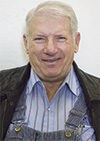Never volunteer. Fellows I’ve known with a military background say that’s the first thing they learn when wearing the uniform. The realities of rural communities, however, are such that without volunteers, not much would happen.
Chances are, that when you need a firetruck or an ambulance, the first person you talk to on arrival has had a conversation similar to the following moments before: “Got a call! Don’t melt things down. I’ll be back as soon as I can!”
This was probably followed by a mad dash to a personal vehicle, then a probably too-fast drive to an ambulance barn or fire station. Most of the time, the apparatus will roll as soon as an adequate crew has arrived and is on board. Other times, there will be radio traffic letting people know that volunteers would have to pass the scene to get to ride on the rig and will just meet the responding rigs there.
One long-time volunteer – part of a rural, mostly volunteer ambulance crew – described herself as the world’s classic introvert.
“I want to be able to help people, but I’m such an introvert that I’m terrified I’ll be stepping into a situation where I’m not wanted. That’s what makes being part of the volunteer ambulance different. When someone’s day has turned so far upside down that they call the ambulance – when we arrive, we are definitely wanted on the scene to help.”
There’s gonna be a few scuzzballs in any society. My life experiences have shown that most people are decent, honest, hard-working and helpful.
Just a short time ago, a grandson had a recalcitrant vehicle, so I loaned him one I had basically just sitting around. This became an adventure.
The first text was that the driver’s side front window would not close. Oops. I forgot to tell him that the window had been kinda wonky and to not open it any farther than he had to. He was working in Spokane, Washington, almost three hours from home. He’d drive back on weekends to try to get his own wheels running. I coached him via text on how to deal with the window and get it up; then to use duct tape or whatever to keep it up until I could get the new parts rounded up. Some fellows he was working with helped him get it closed and suitable for winter driving.
We weren’t done.
The next text was along the lines of, “Sorry to be a pain, but now the car starts when I put the key in the ignition and won’t stop starting after the engine starts.”
He said he had use of a company pickup for overnight since it was now pouring rain. I told him to get a can of WD-40, or other "knock-it-loose" spray, and spray it directly into the keyway. Then, use the key on it and repeat it a few times. The next text was, “That loosened it up, but it’s still starting in just the 'on' position and the starter won’t disengage when it starts.”
I found out what time he got off work and directions. I loaded up the Durango that was my wife’s snowstorm day rig and headed for Spokane.
My ETA was off by a quarter-hour, and by the time I arrived, the grandson and two of the guys he worked with had been just hanging around for that time. We unloaded the Durango and used it to pull the good old Mercury backward from its parking place, then forward to a place where I could back the trailer straight to it so we could winch it aboard.
That we got it loaded, and I got it safely home. That a $35 switch that the ignition lockset turned cured it is not the guts of this tale.
My grandson was in his first year as a high school graduate. He’d been to driving school and had his commercial driver's license (CDL) and had recently started work at a metal fabrication and repair place as the "bring in supplies and deliver the finished product" driver.
His two companions were some older than Luke, both with full beards and carrying themselves as the type you’d want on your side in a brawl.
With equal parts of observing and asking questions, they figured out the plan. They had obviously done this before. With the car loaded and secured, I set about stowing the loading ramps to find it already done and the said ramps secured.
I thanked them for hanging around to make sure we got loaded. They brushed it off, saying they knew Luke was new in town and didn’t want him to be stranded.
These guys didn’t “volunteer.” They just stayed and helped to make sure one of their own was OK before leaving. That’s the kind of people they are.
The kind that gives me hope for the human race.











